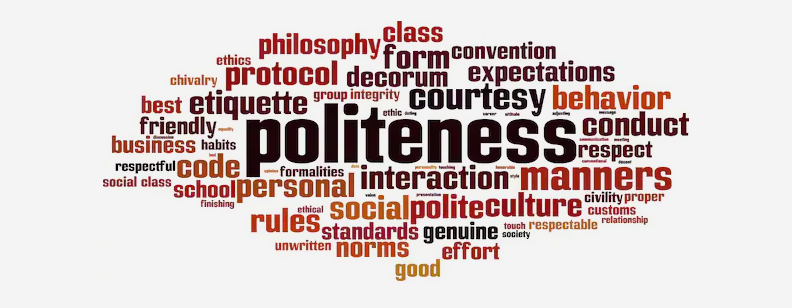Politeness is known as linguistic universal, can we say that the more polite a linguistic form is, the better it is? Why (not)?
Politeness is known as linguistic universal, but it does not mean that the more polite a linguistic form is, the better it is. Higher degree of politeness may not always be polite, and lower degree of politeness may not always be impolite.
What we say should be appropriate according to various factors: social variables,contextual factors, cultural differences, and ranking of imposition, etc.
Here are two examples to show how social variables influence the appropriateness of politeness.
A is the manager of a company. B is his secretary, and C is B’s husband.
Example 1:
It’s 5 o’clock in the afternoon, time for the secretary (B)to clean the manager’s (A) office. But A is still working. So B comes in and says, “Mr. A, I’m very sorry to disturb you, but would it be possible for you to stand up? I’m going to clean your desk.”
It’s not polite for B to interrupt her manager when he’s working. Then B uses the polite form to express her sorry and respect to A. ‘Would it be possible for you…’ , the higher degree of politeness, is appropriate here because it suits the superior-inferior relations.
Example 2:
At six o’clock, B comes home, tired and hungry. Seeing her husband (C) still sit there and watch TV, she’s annoyed and says, “Mr. C, I’m very sorry to disturb you, but would it be possible for you to stand up? I’m going to clean the floor.”
The same form has a quite different conversation implicature. It doesn’t really mean that B feels sorry to disturb her husband and politely asks him to stand up. In fact, when a wife speaks to her husband like that, there are only two explanations.
First, their marriage may meet some problems, and they’re not that intimate than before.
Second, the wife is not satisfied with her husband’s behavior. By using the very
polite form, she makes her complaint, sharply, ironically. The high degree of politeness here means “not polite”, “not satisfied”, or “angry”:
“You are always watching TV!” “So lazy!” “Look at the mess! ” “Don’t you know that I’m tired?” “Why not stand up and help me?” “Why not cook the meal?” “I can’t endure your lazy anymore!”
From the above examples, we can see that politeness is relative. Both example 1 and example 2 use the same polite form, but the effect is quite different. The high degree of politeness in example 1 is appropriate and polite, because the form fits the superior-inferior relations. The same form in example 2 is too polite to be appropriate, because it does not fit the husband-wife relations.
In a word, we can not say “the more polite, the better.” We have to connect our polite strategies with various social, cultural and contextual factors to make our words appropriate.



